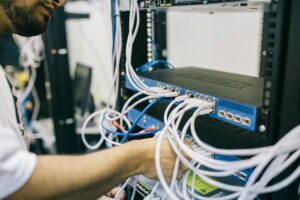What is Technology?
A more comprehensive definition of technology encompasses procedures and processes in addition to tangible tools and forms of organization that enhance the environment or human life in which we live. This includes anything from computer technology and medical procedures to architecture and agriculture.
What is technology ?The Historical Evolution of Technology
The history of technology and the development of human civilization are closely related. The prevailing technology of each period of human history can be used to define it.
Prehistoric Technology
Prehistoric humans started utilizing basic implements like fire spears and stone hammers for survival. One of the most important early technological innovations was the discovery of fire which enabled early people to prepare food and fend against predators and adapt to various environments.
Ancient Civilizations
Technologies developed in tandem with society.The ancient Egyptians used their advanced engineering and mathematical skills to build massive pyramids. The branches of mechanics benefited from the contributions of the Greeks. The Romans created sophisticated road networks known as aqueducts and military equipment that help
Medieval Technology
New inventions like the clockwork clock and massive plow windmills appeared during the Middle Ages. Gutenberg Johannes printing press which transformed the dissemination of information in the 15th century was one of the most revolutionary technologies of this era.
The Industrial Revolution
With innovations like the steam engine spinning Jenny and mechanized industries the Industrial Revolution began in the 18th century and profoundly changed communities. Agrarian economies gave way to industrialized ones throughout this time which resulted in urbanization and profound adjustments to labor structures.
What is technology? The 20th Century and the Digital Age
Rapid technical developments occurred in the 20th century in areas like energy healthcare communication and transportation. Human existence was transformed with the development of the telephone airplane and personal computer.
The advent of computers the internet mobile technology and digital communication marked the beginning of the digital revolution in the second half of the 20th century. These developments have made the globe more interconnected, allowing firms to function internationally and knowledge to be transferred instantly
Types of Technology
Depending on its application or sector of use technology can be divided into a number of categories. The following are a few of the main categories of technology:
Information Technology (IT)
Information technology involves the use of computers networking software and other electronic systems to store, process and transmit data. It includes the internet cloud computing cybersecurity and data analytics. IT has transformed industries such as education finance healthcare and entertainment.
Communication Technology
Communication technology refers to systems and devices that enable the exchange of information. From telegraphs and radios to smartphones and video conferencing platfothese technologies have bridged distances and connected people worldwide.
Medical Technology
Medical technology encompasses tools, machines, procedures, and pharmaceuticals used to diagnose treat and prevent diseases. Innovations such as MRI scanners robotic surger and wearable health monitors have improved healthcare outcomes and increased life expectancy.
What is technology? Industrial and Manufacturing Technology
This involves machinery tools and production systems used in the production of commodities. Examples include assembly line automation 3D printing and computeraided design (CAD) systems.
Energy Technology
Energy technology focuses on the production storage and consumption of energy. This includes traditional energy sources like fossil fuels as well as renewable energy energy technologies such as solar panels wind turbines and electric vehicles.
Agricultural Technology
Agricultural technology or agritech involves tools and processes that improve farming practices. Innovations such as genetically modified organisms (GMOs) precision farming and drone based crop monitoring have boosted food production efficiency.
Environmental Technology
These technologies aim to minimize environmental impact and promote sustainability. Examples include water systems for purification, waste recycling and carbon capture technologies.
What is technology?The Impact of Technology on Society
Technology profoundly affects nearly every aspect of human life. Let explore some of its major impacts:
Economic Growth and Job Creation
Technological advancements drive economic development by increasing productivity and creating new industries. While some jobs become obsolete new roles and opportunities often emerge in tech-driven sectors.
Improved Healthcare
Medical technology has drastically reduced mortality rates, improved disease management, and enhanced patient care. Telemedicine wearable health devices and AI-powered diagnostics are making healthcare more accessible and efficient.
Education and Learning
The internet and digital platforms have revolutionized education making knowledge accessible to people across the globe. E-learning platforms virtual classrooms and online resources have transformed traditional learning methods.
Social Connectivity
Social media messaging apps and video calling platforms enable people to stay connected regardless of geographical boundaries However this has also introduced challenges such as Addiction to digital devices Misinformation and cyberbullying.
Environmental Challenges
While technology has led to industrial growth it has also contributed to environmental degradation climate change and resource depletion. This underscores the importance of sustainable and eco-friendly technological innovations.
What is technology?Emerging Technologies Shaping the Future
As we move further into the 21st century several cutting edge technologies promise to reshape our world:
Artificial Intelligence (AI)
AI involves creating machines capable of performing tasks that typically require human intelligence. Applications include autonomous vehicles virtual assistants and advanced data analytics. AI has the potential to revolutionize industries like healthcare finance and logistics.
Blockchain
Blockchain is a decentralized digital ledger technology that underpins cryptocurrencies like Bitcoin. Beyond finance blockchain is being explored for applications in supply chain management voting systems and digital identity verification.
Internet of Things (IoT)
IoT refers to a network of interconnected devices that collect and share data. Smart homes wearable fitness trackers and connected vehicles are examples of IoT applications that aim to improve efficiency and convenience.
Quantum Computing
Quantum computing harnesses the principles of quantum mechanics to perform complex calculations far faster than traditional computers. Though still in its infancy, it holds promise for breakthroughs in drug discovery, encryption, and climate modeling.
Renewable Energy Technologies
As the world grapples with climate change, renewable energy solutions such as solar wind and bioenergy are becoming increasingly important. Innovations in energy storage and smart grids are also crucial for a sustainable energy future.

Ethical and Social Considerations
With great technological power comes great responsibility. The rapid advancement of technology presents ethical and societal dilemmas:
- Privacy concerns: The widespread collection and use of personal data raise questions about privacy and monitoring.
- Job displacement: Automation and AI could replace many traditional jobs leading to differences in income.
- Digital divide: Unequal access to technology exacerbates social and economic inequalities.
- Misinformation and manipulation: The internet and social media can be used to spread false information or influence public opinion.
- Environmental impact: The production and disposal of electronic devices contribute to environmental pollution.
Addressing these challenges requires ethical leadership, robust policies, and informed public discourse.
Conclusion
Technology is more than just gadgets and machines; it is a reflection of human ingenuity and a driver of societal progress. From the invention of the wheel to the rise of artificial intelligence technology has continuously shaped how we live work and interact with the world.
As we look to the future technology will undoubtedly continue to transform our lives in ways we cannot yet fully imagine. However, with this power comes the responsibility to ensure that technological advancements are used ethicall sustainably and inclusively. By embracing innovation while being mindful of its consequences humanity can harness technology full potential to build a better more equitable world.
In the end understanding what technology is and the complex role it plays in our lives is essential for navigating the challenges and opportunities of the modern age.
Would you like me to format this article into a styled blog post layout or academic essay format too? I can also expand it with some historical examples or future predictions if you’d like!📖 Frequently Asked Questions (FAQs) About Technology
🔹 1. What is technology?
Answer: Technology is the application of scientific knowledge and tools to solve problems, improve human life, and fulfill needs. It ranges from simple tools like a hammer to complex systems like the internet or artificial intelligence.
🔹 2. What are the different types of technology?
Answer: Common categories include:
- Information Technology (IT) – computers, networks, software.
- Communication Technology – phones, social media, video conferencing.
- Medical Technology MRI machines, telemedicine wearable health devices.
- Industrial & Manufacturing Technology – automation robotics.
- Energy Technology renewable energy batteries smart grids.
- Transportation Technology electric vehicles airplanes high-speed rail
🔹 3. How has technology changed our lives?
Answer: Technology has revolutionized how we communicate, travel, work, learn, and entertain ourselves. It’s made processes faster, information more accessible, and healthcare more advanced while also introducing challenges like privacy concerns and digital addiction.
🔹 4. What is Artificial Intelligence (AI)?
Answer: AI refers to computer systems designed to perform tasks that typically require human intelligence, such as recognizing speech, making decisions, learning, and problem-solving.
